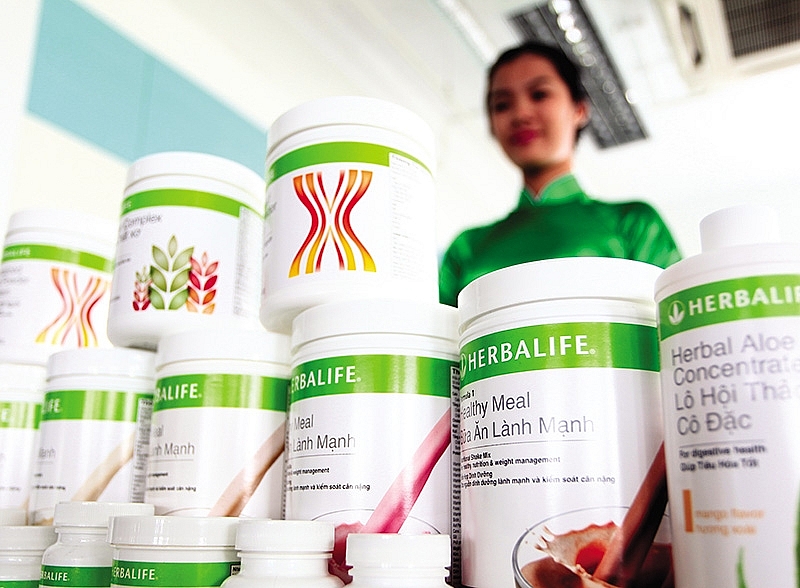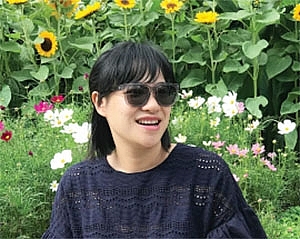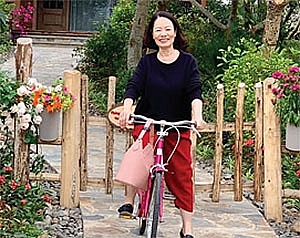Thousand shades of grey in healthy food
 |
| While the market is awash with different types of supplementary food, there are still genuine brands with traceable origin, Photo: Le Toan |
In recent years, supplementary food are becoming more and more popular, especially among office workers.
Thao Van, a 32-year old office worker in Hanoi, is trying to lose weight after stopping breastfeeding her baby. She spends an hour to exercise every day and is looking for a type of supplementary food to burn fat. However, after a few days of browsing, she feels hopelessly lost in the world of supplementary food of varying origins, prices, and quality.
“It is very difficult to choose. Along with products with clear origin from the US, Canada, Japan, Australia, and South Korea that are quite expensive, there are a lot of cheap products from China. I cannot tell which products are safe,” Van told VIR.
According to statistics published by the Vietnam Association of Functional Food (VAFF), only 63 kinds of supplementary food were sold by 13 importers in 2000. Now there are 4,190 foreign and local manufacturers with 10,930 products. In addition, 90 per cent of pharmacies in Vietnam sell supplementary food.
Booming market
Healthcare holds great potential in Vietnam, with the supplementary food segment showing particular promise. According to global market research firm BMI Research, the annual growth of over-the-counter (OTC) pharmaceutical products will hit 10.31 per cent in the 2015-2020 period.
Euromonitor International forecast that the Vietnamese supplementary food market still has great development potential and will grow steadily by 20 per cent per annum.
With this potential, supplementary food is becoming a promising land for both foreign and local manufacturers and distributors as well as importers.
Companies directly selling this kind of food have been growing steadily. Two foreign companies reaping massive profit in the country, Amway Vietnam Co., Ltd. and Herbalife Vietnam, have been operating in the country for more than a decade now. In 2017, Herbalife reported a revenue of $86.96 million, while Amway has two factories in the country.
“With today’s busy lifestyles and increased stress in work and business, people have less time to relax. That is why supplementary food is becoming increasingly popular, especially organic and natural food products,” explained Nguyen Phuong Son, PR manager of Amway Vietnam.
Local pharmaceutical manufacturers are also stepping up to invest in the sector after they began acquiring massive profits from it. Hau Giang Pharmaceutical JSC (DHG), one of the leading companies in pharmaceutical cosmetics and supplementary food in Vietnam, reported an upheaval of its revenue structure and key products. Notably, in previous years, pharmaceuticals made up 80 per cent of its revenue, however, in the recent years, the proportion of supplementary food and cosmetics increased considerably.
Besides, the company narrowed down the list of registered pharmaceutical products from 234 to 220, while simultaneously increasing the list of supplementary food and cosmetic products from 45 to 67 units. The company targets to increase revenue from supplementary food and cosmetics to 12 per cent by 2020.
The sector’s allure has even forced the hands of enterprises which were originally largely uninterested by pharmaceuticals. One of these enterprises is electronics retailer Digiworld JSC.
Digiworld has just revealed its business strategy for 2019, which includes an aggressive incursion into healthcare and consumer goods. The goal this year is to earn at least $58.7 million of gross revenue from these two sectors. In August 2017, the company made its debut with Kingsmen, which promises to improve the physiological energy of men above the age of 40. The product is expected to grow by 100 per cent in revenue, hitting $43.48 million within the next two years.
Several years ago, Binh An Seafood JSC (Bianfishco) emerged as one of the local companies making the largest investments in supplementary food. In 2010, it poured $10 million to develop a collagen drink plant in the Mekong Delta city of Can Tho with the ambition to open a new segment.
At the time, Bianfishco set the target to acquire $4.35 million in revenue from this product in the first year, and the figure would increase to $13.04 million in the second year. According to plan, 30 per cent of the products would have been sold in the local market, while the remaining 70 per cent would have been exported.
However, the company faced financial difficulties, forcing it to close the plant in mid-2012. Thus, after a thunderous marketing campaign, collagen products were withdrawn from the market in silence. This is one of the lessons for those in developing supplementary food. Without a long-term strategy and financial preparation, they may face similar results when they prove incapable of competing with famous imported brands.
Troubles abound
Supplementary food is a mixture of medicine and common food. It is not only new to Vietnam, but to the world. However, regulations are not in place yet to fully cover such products.
In Vietnam, there are five documents by the Ministry of Health (MoH), along with one law and one government decree governing the management of supplementary food, including labelling, advertisement, announcement, production conditions, listing of ingredients, directions of use, and indicators of safety.
However, there is a great number of producers and traders who deliberately violate these regulations, producing poor-quality or even harmful drugs from banned substances that are dangerous to human health.
Last year, an inter-agency delegation launched an inspection at Minh Tam Investment and Trade Services JSC specialising in importing supplementary food and cosmetics. The inspectors found 5,000 items without clear origin and hundreds of bottles of cosmetics without invoices, many past their expiry date. The items were not only displayed at the company’s headquarter, but also distributed online.
This is only one of hundreds of cases to be handled. Deputy director of the Hanoi Market Surveillance Department Trinh Quang Duc said that violators use a wide arsenal to avoid the rules. For instance, many companies have been registered and received product quality certificates from the Vietnam Food Administration (VFA), but they hired other facilities to manufacture the products.
Others were caught to have imported fake goods from China for cheap, then relabelled them to look like they were imported from the US, Japan, and Australia. These items went into circulation online, retailers, as well as convenience and grocery stores at different prices.
Meanwhile, Tran Hung, deputy director of the Ministry of Industry and Trade’s Agency of Market Surveillance, told local media that his agency is developing too fast to manage. For example, only 30-40 per cent of the products inspected conformed to quality requirements, while companies claim 100 per cent.
However, it is not easy to prove charges of falsification or counterfeiting because the agency needs appraised inspection results as well as large funds. Supervising the quality of supplementary food after purchase is the most difficult, because the supervision delegation can only rely on labels and product documents as it has no equipment for laboratory checks.
Moreover, customers often turn to pharmacists or doctors for advice, most of whom do not have much knowledge about nutrition. Many even pretend to be doctors to provide advice and sell goods.
“Those who masquerade as doctors and pharmacists advising consumers to use supplementary food are very dangerous, sometimes making patients not only lose money but also harming their health,” said director of the VFA Nguyen Thanh Phong.
Last year, the agency detected and issued penalties of about $1 million to violators. The fine did not cover statistics from health facilities, local departments, the MoH’s Inspectorate, and other agencies.
According to new regulations, all supplementary food producers will need good manufacturing practice (GMP) certification from July 1, 2019, similar to drug production.
According to the VFA, more than 10 companies producing supplementary food have been certificated for the GMP standards, and the figure will increase to hundreds in the near future.
In addition, Phong also recommended customers not to purchase goods of unclear origins and those without the label, because “This product is not medicine and cannot cure diseases.”
“The products which are introduced to ‘cure,’ ‘treat,’ or claim to be ‘the best product’ are all in violation,” he stressed.
| Nguyen Thanh Phuong - Office worker
I often buy supplementary food from my acquaintances, which are imported from other countries like Japan, South Korea, and Australia. Sometimes, when I go to the hospital for a health check-up, I am advised to use certain kinds of vitamins and nutrition additives and supplements, so I will buy them from pharmacies around the city. Most of the products I used are imported. Also, I do not see too many types of supplementary food made in Vietnam. I still prefer products directly bought from other countries, which are cheaper than officially imported products. I hope that Vietnamese pharmaceutical companies will develop more products which have good quality but reasonable prices. Vo Huy Nhuong - Pharmacist
Customers should buy supplementary food from trustworthy sources like pharmacies and official distributors because there they can find people specialising in health, pharmaceuticals, and nutrition to provide advice. Using poor-quality products will result in metabolic disorders and functional disorders. The pharmaceutical industry is a conditional business sector that requires a specialist or consultant at every facility, which must be certificated for reaching GMP standards. According to health regulations, a pharmacy needs four areas for medicine, supplementary food, cosmetics, and milk and food additives. Besides, nutrition clinics, faculties of nutrition, departments of orthopaedic surgery, and postoperative care units often distribute many types of supplementary food to customers. Lu Yu-xiang - Taiwanese living in Vietnam
I sometimes buy medicines and supplementary food from the pharmacies near the place where I live. However, I would prefer products from Taiwan, and whenever I go home, I stock up on medicines and supplementary food. I am not sure about the quality of the products sold here, and the most important thing is that in Vietnam it is not easy to ask a medical consultant which products I should use. Minh Trang - Hanoi resident
I often use supplementary food such as vitamins, but I have to ask relatives and friends to buy them abroad or from the website of the original producer rather than buying in Vietnam. I do not trust the quality and the origin of supplementary food products sold here, as the market is flooded with counterfeit and low-quality products. I found that the same products are sold at different prices in each store. I have to buy goods hand-carried to Vietnam or directly order from genuine websites at a higher price. If you buy when a brand is running a sales programme, the price is reasonable enough, while we are more assured about the origin and the quality of the products. Bach Hong Chinh - Yen Bai resident
The incomes of Vietnamese people are increasing so the demand for supplementary food is also higher than before, especially among young people. I myself have started using supplementary food about 10 years ago, but all of the products I use are sent by my sister who lives in Australia. I have never bought a single product in Vietnam. As my family often travels between Australia and Vietnam, I received more orders to supply supplementary food to my friends. Normally, when I give the goods to customers, I show them the bills, but they rarely ask me about the goods because they know that my family members live in Australia so they feel more confident. I think one of the reasons customers often do not trust products sold in Vietnam is because they are quite cheap, while imported goods are more expensive because of additional costs. Luu Thi Tam - Hanoi resident
My family has been using supplementary food products for years, spending nearly VND10 million ($435) per month on average. We mostly buy through genuine stores, such as Amway or Siberian Health, or ask family members to buy abroad. Many friends wonder why I don’t order directly from overseas, but I think the quality of products provided by official stores in Vietnam is assured. |
What the stars mean:
★ Poor ★ ★ Promising ★★★ Good ★★★★ Very good ★★★★★ Exceptional
Related Contents
Latest News
More News
- Nestlé Vietnam's Lunar New Year campaign reframes how Tet is counted (January 28, 2026 | 11:40)
- Tet event in Japan celebrates success of 14th National Party Congress (January 25, 2026 | 10:04)
- 14th National Party Congress wraps up with success (January 25, 2026 | 09:49)
- Congratulations from VFF Central Committee's int’l partners to 14th National Party Congress (January 25, 2026 | 09:46)
- List of newly-elected members of 14th Political Bureau announced (January 23, 2026 | 16:27)
- 14th Party Central Committee unanimously elects To Lam as General Secretary (January 23, 2026 | 16:22)
- List of members of 14th Party Central Committee announced (January 23, 2026 | 09:12)
- Highlights of fourth working day of 14th National Party Congress (January 23, 2026 | 09:06)
- Press provides timely, accurate coverage of 14th National Party Congress (January 22, 2026 | 09:49)
- Press release on second working day of 14th National Party Congress (January 22, 2026 | 09:19)







 Tag:
Tag:




















 Mobile Version
Mobile Version